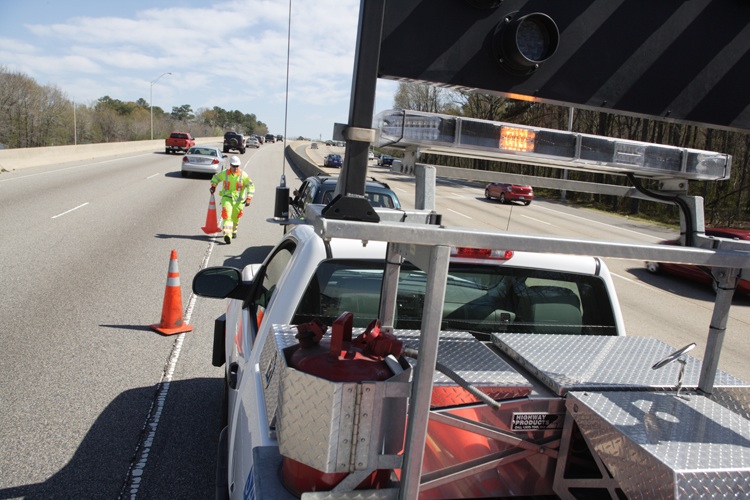Finding the Right Fit:
Outsourcing Safety Service Patrols
By Manya Chylinski
Private contractors run an estimated 39% of Safety Service Patrols. With more than 70% of all programs receiving funding from their state’s department of transportation,* why do agencies opt to use outside contractors in place of state employees to run their programs?
Though Virginia’s first Safety Service Patrol, in northern Virginia, started in the early 1990s with state employees, over the years they have migrated to an outsourced model due to budget issues limiting the total number of staff the state could employ. The operators for Virginia’s northern and southern regions’ Safety Service Patrols are now private contractors.
“We’re used to outsourcing,” says Perry Cogburn, Assistant Division Administrator for Field Operations, Virginia DOT. “A lot of our other transportation and highway related work, like construction and snow removal, is outsourced.”
In Michigan, the Freeway Courtesy Patrol in the Detroit metropolitan area started when several private entities formed a safety alliance and hired private operators. The private operators remained, but management of the program moved to the state as the program grew in scope.
In Illinois, the Emergency Traffic Patrol program began in 1962 with state employees, including some of the engineers who helped design the interstate. The program was the first of its kind and worked well, so as it expanded outsourcing was never an option.
The same is true for the Pennsylvania Turnpike Commission. The Commission, while it is no stranger to outsourcing other services, has always provided the Safety Service Patrol’s services on the Turnpike, “With respect to our maintenance workers [SSP drivers], we look at what they do as a core function. We at the Turnpike Commission want to provide it as opposed to outsourcing.”
In Virginia and Michigan, the departments of transportation have identified specific advantages to using private contractors for their Safety Service Patrols.
Contract management is one of the advantages. In Michigan, managing the program means that one project manager from the department of transportation works with the project manager for the private operator. This streamlines operations for the DOT. Budget control is another benefit of using private operators. Contracts means costs are predictable—they are either fixed or capped.
A third advantage to outsourcing to private operators is personnel issues. In some government agencies, the process for disciplining an employee can be complex or time consuming. When working with a contractor, the agency can simply request a change.
There are a few disadvantages to working with private contractors as well. First is loss of control over hiring decisions. In Michigan, for example, they have specific requirements for things such as training of Safety Service Patrol employees, but they don’t have any say in screening those employees. Related to that is the loss of direct control and feedback on driver performance.
William Capone, Director of Communications and Public Relations at the Pennsylvania Turnpike Commission highlights control over driver’s performance as a benefit of not outsourcing, employing the Safety Service Patrol drivers (maintenance workers) gives “some possible better control in maintaining standards and the level of service that you want to offer.”
“We require a full report of performance issues, but we don’t know all the details about what happened or the resolution of the issue,” says Matt Smith, Metro Region Traffic & Safety Engineer, Michigan Department of Transportation.
A third disadvantage perceived by some state operators is a lack of ownership of the role by contracted employees. When the employees work for the DOT or the highway patrol, there is an inherent sense of responsibility for the safety of the roads, a sense of doing the job because of a love of helping people, that some feel makes these programs stronger.
Steve Travia, Bureau Chief of Traffic Operations, Illinois Department of Transportation, says “I know that 24/7, 365 days a year, there will be an IDOT person in an IDOT truck to help, a commitment from someone whose primary responsibility is to ensure safety and control traffic.”
Lastly, though many see contracts as a benefit of outsourcing, the set guidelines of a contract can be a disadvantage, since they cannot easily be changed if the scope of work changes. Says Travia, “If I have a special event, for example, I would have to write the possibilities into a contract in advance, even though needed manpower and other resources for these unusual events are an unknown. With IDOT employees we can be flexible and take care of any special requirements, including traffic control.”
“The key to a successful relationship with an outsourced partner is to be very specific in the contract guidelines,” says Smith of Michigan DOT. “Be very clear on expectations. The more black and white you can be on issues like routing guidelines, training requirements, marking of patrol vehicles, and performance measurements, the easier managing the contract will be.”
“Most of all you’ve got to get someone who really wants to do the work, who is flexible and wants to work with the state,” says Virginia DOT’s Cogburn. “We don’t look at our SSP employees as contractors. We look at them as fellow co-workers, doing a needed job. Just because the individuals are not being paid directly by the government doesn’t mean they aren’t providing wonderful service.”
“Everybody is different and everybody has their own specific challenges, fiscally and otherwise with operations,” explains Pennsylvania Turnpike Commission’s Capone, “Everybody is looking to operate more efficiently and to reduce operating expenses. Whether we would ever look at the outsourcing approach for the State Farm Safety Patrol more seriously or not, that remains to be seen.” The decision to outsource Safety Service Patrols is dependent on the best model that will meet the state authority’s needs.
* Malcolm Baird, Overview of Freeway Service Patrols in the United States, November 2008.

